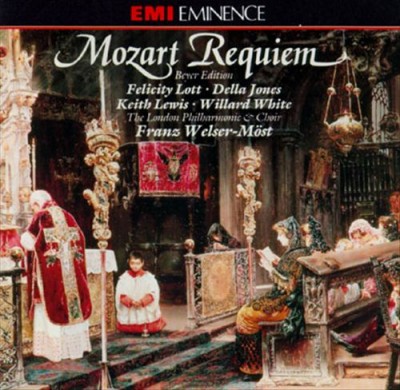Performance DetailsRelease DetailsReviews
Soprano: Felicity Lott
Mezzo-Soprano: Della Jones
Tenor: Keith Lewis
Bass-Baritone: Willard White
Choir: London Philharmonic Choir
Orchestra: London Philharmonic Orchestra
Conductor: Franz Welser-Möst
Date: April, 1989
Venue: St. Augustine’s Church, Kilburn, London, UK
Label: EMI Eminence
Cat No.: CD-EMX 2150
Released: 1990
Mozart’s Requiem is one of those pieces on which you don’t want to have to compromise in a recording. It’s either an inspirational rendition of an elusive, unfinished – even flawed masterpiece, or it’s just another disc which will sit on your shelves gathering dust. Welser-Möst’s opening is coloured by a rather sour clarinet, whose buzz-saw tones affect the whole sound of the orchestra once your ear has latched onto it, about 11 seconds into track one. The choir is fine, if sometimes a little too shouty for my taste. Take the men’s entry 21 seconds into the Dies irae or the opening of the Confutatis maledictis and you’ll hear what I mean. The balance tends to drown out the orchestra as well, so that there is precious little detail from either in the big tuttis. The soloists are generally fine, and Willard White is also part of one of my favourite recordings of this work, coming across rather more effectively with John Eliot Gardiner on Philips. Della Jones can be a bit overly-dramatic, hacking out the notes which go over her break point 1:50 into the Tuba mirum. The ensemble work in the Recordare is nicely done as elsewhere, and the soloists do balance and blend with each other rather than fighting for supremacy.
There are many nice things about this recording, but with so many others which offer so much more I can’t gather too much enthusiasm. My own favourite is still that of the 1986 Gardiner on Philips, but this does have the leaner sound of his baroque specialist instrumentalists and Monteverdi choir. If you are looking for a budget ‘non-authentic’ recording of the Requiem you could do far worse than that of Rafael Frühbeck de Burgos on CFP, and don’t be put off by that 1964 recording date – those old analogue recordings are sweet as a nut. Either that or you could opt for the more up to date Morton Schuldt-Jensen on Naxos.
— Dominy Clements, MusicWeb International
